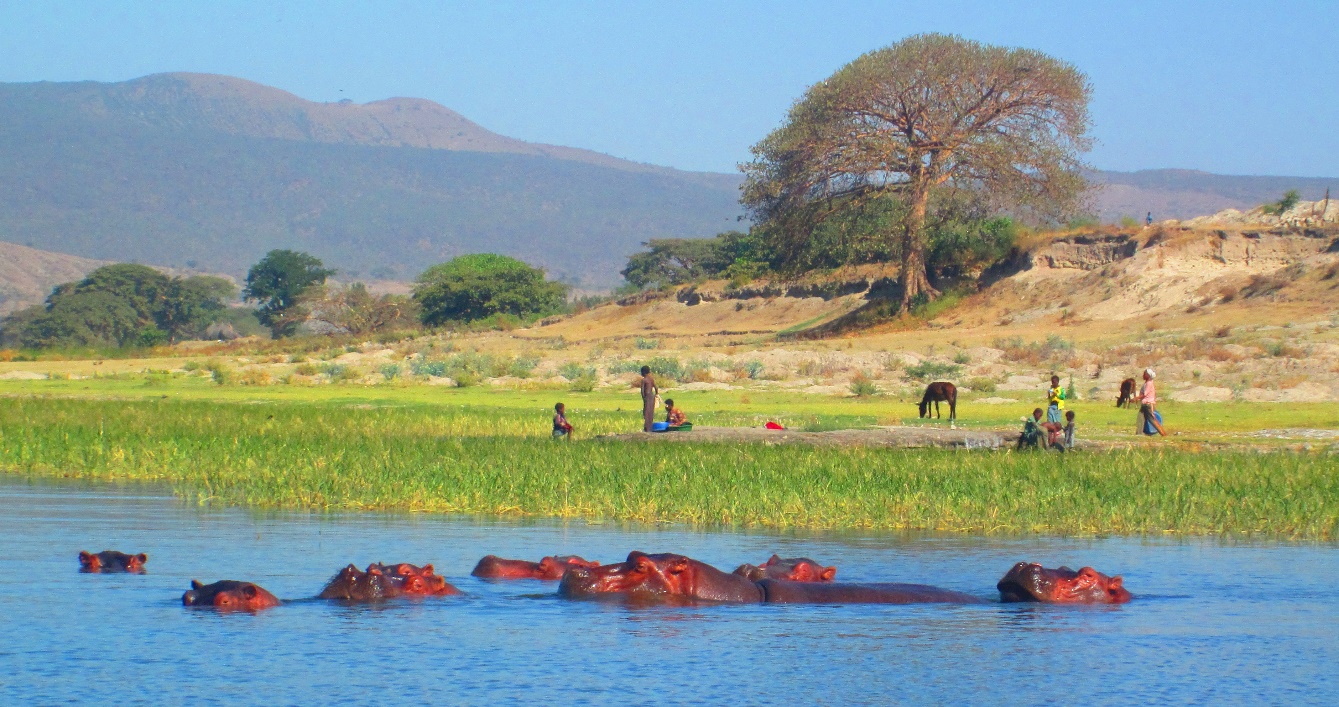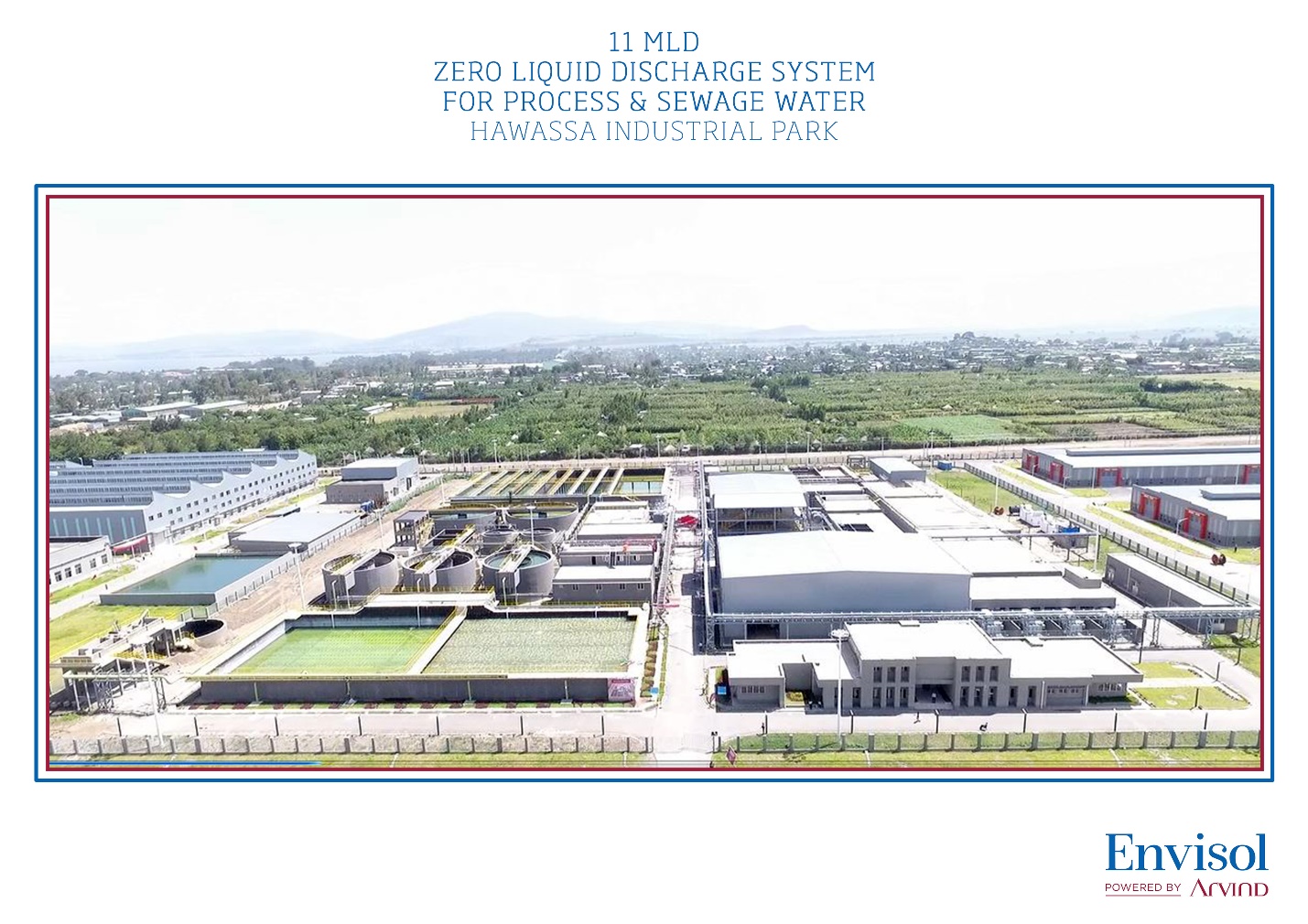A SUCCESSFUL EFFORT TOWARDS WATER SUSTAINABILITY
The following case study throws light on how one of the fastest-growing economies in the world like Ethiopia, has facilitated large industrial investment without compromising on its natural resources by implementingation of the patented PTET PFET technology by Arvind Envisol, for at it’s water treatment plant at Hawassa Industrial Park, ETHIOPIA
By Arvind Envisol
When industrialization and economic growth knocked at Ethiopia’s door, it not only brought with it the fear of losing one of its most critical natural resources – water, but also the loss of a biodiversity hotspot like Lake Hawassa. Ethiopia used effective water management technologies in partnership with Arvind Envisol to overcome these threats and sustain its status as one of the world’s fastest growing economies.
WATER IN ETHIOPIA- A PRECIOUS RESOURCE FOR GDP:
According to a 2017 report by the Government of Ethiopia and United Nations Office for the Coordination of Humanitarian Affairs (OCHA), 10.5 million people in Ethiopia would not have regular access to safe drinking water in 2018. Yet, the country is one of the fastest growing economies in the world. In recent years, several large textile conglomerates have shifted their focus to Ethiopia, attracting rising investments. The Ethiopian government has been building industrial parks in different cities of the country that are believed to enhance the textile investment and productivity of the country, which ultimately helps to boost the country’s GDP and generate employment.
Therefore, in Ethiopia, water is not only an extremely precious resource for its natural domestic uses, but also a vital need to further its economic goals of growing industrialization.
HAWASSA INDUSTRIAL PARK:
Hawassa Industrial Park, the largest industrial park in Ethiopia caters mainly to two industrial sectors –textiles and garmenting, and both are large consumers of water. The park, when all facilities are operating at full capacity, utilizes 8 million litres of water per day for production purposes and another 3 million litres per day is utilized for domestic purposes such as drinking, gardening and flushing.
The park comprises of facilities of prestigious companies including Hydramani, TAL, Indochine, Arvind, Raymond, PVH, Wuxi, among others, employing nearly 50,000 people. Due to the diversity in industrial processes, the composition of the effluent is unpredictable, making it even more important for the technology employed to be able to process any kind of waste.
Located in the same vicinity is Lake Hawassa, richer in fauna than most other water bodies in the country and home to several animals like hippopotami including severaland different species of migratory birds.

Lake Hawassa, a habitat for several animal species in the region (Picture: Exploring Tourism Ethiopia)
PARTNERSHIP BETWEEN ARVIND ENVISOL & THE GOVT. OF ETHIOPIA:
The cost of environment restoration post degradation is 25 times the cost of environment protection. Realizing the impact these parks might have on its resources, the Government of Ethiopia did not want to refrain from large investment and employment opportunities. Therefore, they had to seek a solution which allowed them to protect their water resources without compromising on their better economic future. Environmental impact assessments of the park declared that the park was required to have a Zero Liquid Discharge system in place.
In that regard, the government signed a Memorandum of Understanding (MoU) in 2015, with ArvindEnvisol, a subsidiary of Arvind Limited, for a Zero Liquid Discharge (ZLD) water treatment plant at Hawassa Industrial Park. ZLD is a water treatment process in which all waste water is purified and recycled leaving ‘zero’liquid discharge at the end of the cycle. Zero Liquid Discharge has gained traction due to a growing, global concern about the impact of wastewater discharge on the environment.
KEY FEATURES OF ARVIND ENVISOL’S SYSTEMS
For this project, the Govt. of Ethiopia reviewed multiple companies working in water management, across the world. It was only Envisol, however, that could promise a 100% zero liquid discharge at low costs. Additionally, being an entity under Arvind Ltd., one of the world’s biggest textile and garment manufacturers, Envisol possessed a detailed understanding of the expected effluent from the Greenfield project, something that no other water management company could offer. We helped them define their problem statement and advised them on important areas like the commercial tariff for their tenants.
OTHER FEATURES OF ARVIND ENVISOL’S ZLD SYSTEM ARE:
• Its patented PFET technology saves up to 80% energy compared to other ZLD technologies.
• 100% of available water is recycled, with minimal loss through open tanks and sludge.
• It has the capability to treat and retrieve valuable by-products from waste (i.e. salts)
• Offers one of the lowest cost ZLD solutions in the world
OBJECTIVES OUTLINED FOR ENVISOL:
• Environmental compliance: Envisol had to ensure that its treatment met with the compliance norms set by the Industrial Parks Development Corporations(IPDC) and Ministry of Environment, Forest and Climate Change, Ethiopia (MEFCC).
• Conservation of ground water resources: Ground water sources especially Lake Hawassa should not be affected in any way by the industrial park.
• Sustainability norms: Due to the large presence of environmentally conscious American and European clients in the park, the park should provide compliance-ready manufacturing facility for its investor tenants to comply with company-specific norms of their international buyers, of their products.

KEY CHALLENGES:
• The Hawassa Industrial Park was Envisol’s first large-scale international project requiring them to set up all infrastructure from scratch. Since this was the first project of its kind in the African continent and given the low availability of materials and infrastructure in Ethiopia, the company was required to import all machinery from India including simple bolts and nuts. The entire skilled labor for installation and commissioning also needed to be provided from India.
• Withclients and consultants being Ethiopian and the main contractor for the overall park being a Chinese company, there were several technical common-ground issues and language barriers required to be overcome.
• Envisol was brought into the picture, only 3 to 4 months before the inauguration of the park construction, giving them very little time to initiate and complete their installation, in time for the various companies to start with their manufacturing.
• Since Ethiopia is a landlocked country, logistics was a major challenge to be overcome, given that all the material had to be routed through Djibouti.
• The opex expectation was very low and the government was unwilling to pay high costs of a ZLD.
• The task asked for a tailor-made approach to balance some unique aspects of the client like the sewage-
effluent mix, usage of locally available chemicals, unavailability of cheap coal etc.
IMPACT: THE OUTCOMES OF THE PROJECT
The implementation of a zero liquid discharge system towards a more water-friendly future has resulted in an ecological and sustainable industrial park with the following results:
• Envisol recycled 100% of the available water consumed by the Hawassa Park, one of Africa’s largest industrial parks with the lowest cost of operations in the world.
• The project was commissioned in a record time of 10 months.
• Lake Hawassa remains pristine, without any contamination and deterioration of its water levels.
• The park treats 11 million litres of waste water per day, sustaining the entire park, a total of 52 sheds comprising 400,000 square meters of manufacturing and ancillary facilities.
• Envisol’s water-sustainability plan at Hawassa Industrial Park was the key factor which won PVH, one of the world’s largest apparel companies and owner oficonic brands like Calvin Klein and Tommy Hilfiger,the prestigious 2018 U.S Secretary of State’s Award for Corporate Excellence (ACE) in the category of Sustainable Operations.The annual award, presented by the U.S government, recognizes U.S. companies with international best practices in sustainability and development of the local economies in which they work.
SWEET FRUITS OF ARDOUS WORK
‘Even beyond the technology we offered, Envisol was fully aware of and respected the absolute importance of ground-water sources to Ethiopia. Creating our infrastructure from scratch, right from the equipment used to employee training was a tedious task. However, our work was fruitful in the end. Seeing companies like PVH win awards for their sustainability and a beautiful piece of nature like Lake Hawassa clean, makes our work so much more than just treating industrial waste water. We are proud to be an integral part of the Green industrialization strategy which has always been an African dream but is Ethiopia’s reality. We will continue to work with the Industrial Parks Development Corporation (IPDC) to jointly provide these solutions to other African nations’, said Mr. Ashish Kumar, CEO, Arvind Envisol
MOVING BEYOND HAWASSA:
For every $1 invested in water, there is an economic return of $5 to $13. Post its successat Hawassa, Envisol has already begun work on 12 additional projects at Kilinto, Dire Dawa and Adama, etc. through another MoU with the Govt. of Ethiopia signed in 2017. Other African nations, noticing Ethiopia’s water management practices have also approached Envisol for similar installations.
CHERISHABLE COMMENTS:
Commenting on the Hawassa Park, Ato Shifraw Selomon, Deputy CEO, Parks Operation & Management Directorate, Industrial Parks Development Corporation (IPDC), Addis Ababa, Ethiopia says ‘Before constructing the park, three to four research studies were conducted, one of which was, an environmental impact assessment. Based on the study’s recommendations, it was decided that garment production in the industrial park could not take place without Zero Liquid Discharge. Not one glass of water could be discharged from the Hawassa Park. Today, Arvind Envisol’s Zero Liquid Discharge technology has helped us create environmentally friendly water-systems, protecting Lake Hawassa. Ethiopia has a green economic strategy and we will introduce similar approaches in other industrial parks.’
About the Contributor
Ashish Kumar, CEO, Arvind Envisol Launched in 2011, as part of Arvind Limited, Envisol is a world-class water management company providing end-to-end solutions for water treatment, industrial waste water treatment, sewage treatment and zero liquid discharge solutions at minimal costs.
To know more about the contributor of this case study, you can write to us. Your feedback is welcome and should be sent at: nisha@eawater.com or visit us at http://www.eawater.com
